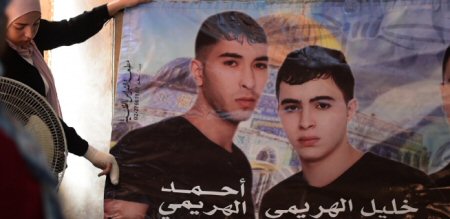In a raid on the Wadi Ma’ali neighborhood, at 4:30 a.m., near Bethlehem’s Old City, Israeli soldiers raided the homes of Palestinian prisoner Ayyad al-Hreimi’s family, resulting in two hospitalizations from dog bites, and the arrest of al-Hreimi’s 19-year-old cousin, Mohannad.
Two of al-Hreimi’s brothers were already imprisoned when al-Hreimi’s cousin was arrested last night.
The soldiers destroyed property belonging to the prisoners’ family and neighbors before leaving, even though the purpose of the raid remains unknown, according to the PNN.
The mother and sister of the Mohannad Hreimi, the youth who was arrested, arrived late in the morning, from the hospital, with gauze covering their hands, showing the damage that Israeli canine unit, called the “Oketz” Unit, can inflict upon the Palestinian people.
The Oketz unit uses the Belgian Shepard, or the Malinois, because of the breed’s large size.
The father also showed cuts from the dogs on his legs, going from his knee to his ankle.
Ayyad al-Hreimi gained prominence when his 52-day hunger strike was reported, while he was in prison. Hunger strikes are a common form of protest against the Israeli occupation of Palestinian territories, and against the conditions for Palestinians in Israeli prisons.
Ayyad al-Hreimi has been imprisoned without an open trial since December 7, 2018. Reason for a detention is often kept secret under the pretext of national security.
Israeli rights group B’Tselem reports that the purpose of these “administrative” detentions is said to be for the purpose of preventing actions that Israeli authorities believe would be carried out by detained Palestinians, had they not been imprisoned.
This is problematic, because the charges for such arrests are, more often than not, kept secret, and regularly do not involve any crime committed. This makes a forming a defense, in court, nearly impossible.
Night Raids are a common way of carrying out such arrests. Al Jazeera reports that most Palestinians understand night raids as merely a form of intimidation. Communities where a high profile arrest has happened often find an increase in night raids and Israeli patrol.
Night raids can have an intense psychological effect on the people who experience them. Ranging from difficulty sleeping to symptoms of Post-Traumatic Stress Disorder, the repeated exposure to this type of campaign can create intense distress for the people in occupied Palestine.
Search IMEMC: “dogs”




